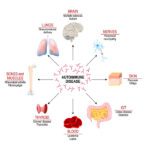Dismissing the Most Common Myths About HRT & Menopause
Hormone replacement therapy (HRT) and menopause are subjects often shrouded in myths and misconceptions, leading to confusion and misinformation. Here, we aim to debunk some of the most common myths surrounding these topics.
Myth 1: Menopause Is An Illness That Requires Treatment
Menopause is a natural phase of a woman’s life, much like puberty. It’s not an illness but a normal biological process that marks the end of a woman’s menstrual cycles and fertility. However, it does bring about hormonal changes that can lead to physical and emotional symptoms.
These symptoms can be managed with lifestyle changes and, in some cases, medical treatments like hormone replacement therapy. The goal is not to treat menopause but to manage the symptoms and potential health risks (like osteoporosis) associated with hormonal changes.
Myth 2: HRT Is Only For Hot Flashes
While hormone replacement therapy is indeed effective in relieving hot flashes — one of the most common symptoms of menopause — it offers a myriad of other benefits. HRT can also alleviate other menopausal symptoms like night sweats, mood swings, vaginal dryness, and sleep disturbances. Additionally, it helps maintain skin elasticity, bone density, and overall cardiovascular health.
Myth 3: HRT Leads To Weight Gain
Menopause itself, due to hormonal changes, can lead to weight gain, particularly around the abdomen. Many people mistakenly attribute this weight gain to hormone replacement therapy. However, multiple studies have found that HRT can help manage menopausal weight gain and promote a healthier body composition when coupled with a balanced diet and regular exercise.
Myth 4: HRT Increases The Risk Of Heart Disease
Early research raised concerns about the potential link between HRT and an increased risk of heart disease. However, more recent and comprehensive studies have shown that the timing and type of HRT are significant factors. When hormone replacement therapy is initiated early in menopause, it may have a protective effect on heart health.
Myth 5: HRT Causes Breast Cancer
This is perhaps the most pervasive myth about hormone replacement therapy. The relationship between HRT and breast cancer is complex and depends on various factors, including the type of HRT, duration of use, and individual health status. Some types of HRT have been associated with a slightly increased risk of breast cancer, but it’s essential to weigh this risk against the benefits of HRT in consultation with a healthcare professional.
Myth 6: Natural Remedies Are Always Safer And Better Than HRT
While some women find relief with natural remedies, they are not always a safer or more effective choice. ‘Natural’ doesn’t necessarily mean ‘safe,’ and these remedies also carry risks and potential side effects. Moreover, unlike HRT, their efficacy is often not backed by robust scientific evidence.

Navigating menopause and the decision to undertake hormone replacement therapy can be challenging, but having the correct information can empower you to make informed choices about your health. That’s why you should turn to Ryze HRT for all your hormone therapy needs. We have successfully helped numerous people overcome hormonal imbalances thanks to our highly-skilled team.
Contact us today, and we’ll help you understand all the wonderful benefits of women’s HRT.




